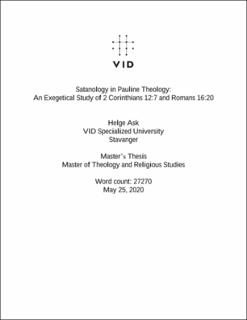| dc.description.abstract | We begin this Master thesis by questioning what the function of Satan is in the two Pauline verses 2 Cor 12:7 and Rom 16:20 and if their Satanological implications are compatible with each other. We further question how these two verses fit into the overall portrayal of Satan in the Pauline letters. Additionally, we question if the Satanological ideas of the Old Testament and Second Temple Judaism are reflected in the Pauline letters.
In order to be able to identify potential Satanological reflections of the Old Testament and Second Temple Judaism in the Pauline letters, we must first briefly present the overall Satanological outlook of the Old Testament and Second Temple Judaism. We shall also add the New Testament (excluding the Pauline letters) to this brief presentation. The Satanology of the Old Testament diverges in many ways from that of the Second Temple Judaism and the New Testament. In the Old Testament, Satan is mainly understood as a servant of God. However, in the Second Temple Judaism and the New Testament, Satan is additionally (although not necessarily in discord with the Old Testament image) clearly understood as an evil being. A certain doubleness of Satan’s servant-role and role as an enemy is nevertheless preserved in both the Second Temple literature and the New Testament, a feature which is also vaguely hinted at in the Old Testament. An important element to notice in both the Old Testament and the Second Temple literature is that God is repeatedly portrayed as ultimately in control and as the one who will defeat and condemn Satan.
As we do an exegetical study of the two Pauline verses 2 Cor 12:7 and Rom 16:20, we also encounter this double-sided impression of Satan as both God’s servant/tool and enemy. Although certain aspects of these two verses remain ambiguous, we may with certainty conclude that there are two distinct impressions of Satan’s function in 2 Cor 12:7 and Rom 16:20. In 2 Cor 12:7 he functions (indirectly through his messenger) as a thorn which is given to discipline and preserve Paul’s spiritual life. An important remark here is that the ultimate giver of the thorn is God and not Satan. In Rom 16:20, Satan functions exclusively as an enemy to be crushed by God under the feet of the church. What is noteworthy with this is that the idea that God will crush his enemies under his (although here the church’s) feet, is also clearly attested in both the Old Testament and the Second Temple literature. As we continue further with a comparative study between these two
ii
verses and their Satanological implications, we observe that these two sides of Satan’s function are in fact compatible with each other. This is perhaps mainly because God is in both of these Pauline verses portrayed as the one ultimately in control, either as the giver of the thorn or as the crusher of Satan. Moreover, this is a clear feature of the Satanology(ies?) of both the Old Testament and the Second Temple texts, as well. Paul’s Satanology of 2 Cor 12:7 and Rom 16:20 does, as such, reflect central features of the Satanological outlook of both the Old Testament and Second Temple Judaism. A certain tension is, however, still present between 2 Cor 12:7 and Rom 16:20.
Finally, an overall study of the Satanology portrayed in the Pauline letters broadens the image that 2 Cor 12:7 and Rom 16:20 present of the Satan-figure. But the two aspects of Satan as a servant/tool of God and as evil, as seen in 2 Cor 12:7 and Rom 16:20, are upheld. The aspect of God as sovereign is additionally confirmed. Hence, the Satanology of the Pauline letters is theocentric in the sense that Satan is continuously understood as inferior to God. | en_US |
